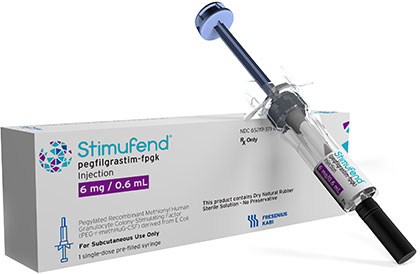KabiCare Patient Support Program forSTIMUFEND® (pegfilgrastim-fpgk)

STIMUFEND® is FDA approved and is indicated to decrease the incidence of infection in patients whose immune system is weakened due to chemotherapy for certain types of cancers. STIMUFEND is also FDA approved and is indicated to increase survival in patients whose immune system is weakened due to acute exposure to myelosuppressive doses of radiation.
Acute Radiation Syndrome: The effectiveness of pegfilgrastim for this use was only studied in animals, because it could not be studied in people.
Learn more about Febrile Neutropenia.
For more information about Biosimilars please visit our website: BioSpecialized (Opens in a New Window)
Important Safety Information